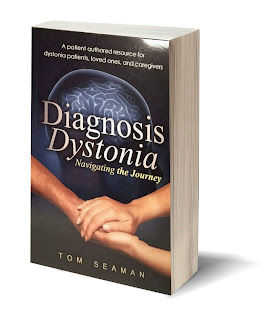We often hear the term Post Traumatic Stress Disorder (PTSD), a mental health condition triggered by a traumatic event. PTSD is commonly used in context of military personnel returning from active duty, but it applies to anyone who has faced traumatic events such as sexual or physical assault, an acute or chronic health condition, natural disasters, the unexpected death of a loved one, or an accident.
Most people who experience a traumatic event will have reactions that may include shock, anger, nervousness, fear, and even guilt. These reactions are normal and for most people go away over time. For a person with PTSD, however, feelings of intense fear, helplessness, or horror continue and may even increase, becoming so strong that they keep the person from living a fulfilling life. Some people with health conditions like multiple sclerosis, Parkinson's disease, dystonia, chronic pain, and many others experience PTSD.
A term we hear far less about, if at all, is called Post Traumatic Growth (PTG). PTG refers to people who become stronger and create a more meaningful life in the wake of tragedy or trauma. They don’t just bounce back, which is resilience; they bounce higher than they ever did before.
PTG is characterized by people changing their views of themselves, such as an increased sense of strength; “If I lived through that, I can face anything.” They tend to show more gratitude and have greater acceptance of their vulnerabilities and limitations, and also develop a sense that new opportunities have emerged from their struggle. Relationships are enhanced; people come to value their friends and family more, feel an increased sense of compassion for others and a longing for more intimate relationships.
They can also experience an increased sense of connection to others who suffer, which is evident in the support groups many of us belong to where we find great empathy and compassion. They gain a greater appreciation for life in general, finding a fresh, positive outlook each day; they re-evaluate what really matters in life, become less materialistic, and are better able to live in the present. Another common feature is a change or deepening in spiritual beliefs.
I was never diagnosed with PTSD, but I lived through periods of intense fear, anger, desperation, and hopelessness after experiencing a dramatic shift in my life due to chronic pain from dystonia. Having worked through a lot of these emotions over the years, I have seen a significant amount of growth.
I appreciate many things I once took for granted. I realize how fragile life is and how it should be honored by treating ourselves and others with love and respect. I have a much deeper appreciation for people who struggle with life challenges. I have come to better understand the meaning of loss which has increased my ability to live in gratitude. I have also found greater meaning to my life and feel a deeper spiritual connection.
HOWEVER, I had to get past my anger and open myself up to opportunities, which took time. I needed to grieve for the life I lost. Once I did, I saw things very differently and began behaving in more positive ways. The key was not being so stubborn and peeking outside my box of comfort and seeing the life I could create for myself, all the while still living with chronic pain and dystonia.
Any life challenge can truly be a source of growth for all of us in ways we probably never imagined, and research has shown that in the face of great challenges, significant human and spiritual growth can occur. In order for it to take place, it is crucial that we are open to the possibilities that lie within our “misfortune.” We must abandon hatred and anger, for it will only worsen the pain we feel, preventing us from any kind of growth. Every experience is an opportunity to learn and reach a higher level of well being.
Tom Seaman is a Certified Professional Life Coach in the area of health and wellness, and author of the book, Diagnosis Dystonia: Navigating the Journey, a comprehensive resource for anyone suffering with any life challenge. He is also a motivational speaker, chronic pain and dystonia awareness advocate, health blogger, and volunteers for the Dystonia Medical Research Foundation (DMRF) as a support group leader, for WEGO Health as a patient expert panelist, and is a member and writer for Chronic Illness Bloggers Network. To learn more about Tom’s coaching practice and get a copy of his book, visit www.tomseamancoaching.com. Follow him on Twitter @Dystoniabook1 and Instagram




Love this piece. So interesting. I think people do not fully understand that we have all lost something including our identity.
ReplyDeleteThank you Julie. I agree. So much is lost when our lives get turned upside down with a limiting health condition. Most only recognize those that we get and heal from in a short period of time, since this is what most people experience. "Chronic" requires a whole new paradigm shift. However, it can change us for the good as well, as long we we choose to use if for good :)
DeleteThank you for sharing this information. keep posting.
ReplyDeleteDystonia Treatment in UAE
I was diagnosed as HEPATITIS B carrier in 2013 with fibrosis of the
ReplyDeleteliver already present. I started on antiviral medications which
reduced the viral load initially. After a couple of years the virus
became resistant. I started on HEPATITIS B Herbal treatment from
ULTIMATE LIFE CLINIC (www.ultimatelifeclinic.com) in March, 2020. Their
treatment totally reversed the virus. I did another blood test after
the 6 months long treatment and tested negative to the virus. Amazing
treatment! This treatment is a breakthrough for all HBV carriers.